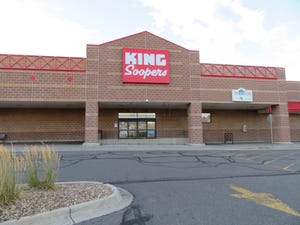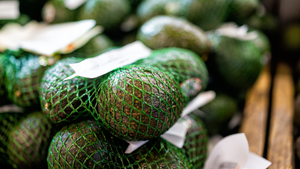ORGANIC INTEGRATIONORGANIC INTEGRATION
Retailers are spoon-feeding organics to conventional shoppers while gaining credibility with consumers who eat these foods exclusively. The adoption of two separate merchandising strategies in a single store is allowing retailers to appeal to both ends of the spectrum. Shelf-stable specialty organic brands like Amy's Kitchen and Back to Nature not readily known by mainstream consumers are being merchandised
January 15, 2007
LIZ PARKS
Retailers are spoon-feeding organics to conventional shoppers while gaining credibility with consumers who eat these foods exclusively.
The adoption of two separate merchandising strategies in a single store is allowing retailers to appeal to both ends of the spectrum.
Shelf-stable specialty organic brands like Amy's Kitchen and Back to Nature — not readily known by mainstream consumers — are being merchandised in specialty and natural food store-within-a-store departments, while organic versions of more conventional national-brand items are being presented alongside their same-brand counterparts.
“There are different consumer expectations about organic foods, so we have chosen to merchandise them in two different ways to meet those different expectations,” said Joe Hanson, vice president of operations for Spokane, Wash.-based Yoke's Family Centers.
Yoke's has a store-within-a-store specialty natural/organic food department called Nature's Corner in two of its 13 stores, a scaled-down version in one store and integrated organic sets in its other stores. The retailer plans to expand some variation of Nature's Corner into at least half the chain's locations.
“We think the corporate organic food items coming to market will make a nice segue into bringing non-organic consumers into the organic food category, but we don't think the regular or loyal organic shopper will immediately switch to corporate organic brands or will even want to see those brands in the specialty organic section,” Hanson said. “It may take time for the regular organic shopper to accept or trust those brands.”
When it launched its O Organics line last year, Safeway, Pleasanton, Calif., adopted a dual placement strategy, merchandising these products within a section dedicated to specialty natural/organic foods as well as integrating individual O Organic items in with mainstream products from the same category.
“We wanted to make O Organics available to people who had not tried organic products,” said Safeway spokeswoman Teena Massingill. “Those who normally shop organics will naturally seek out O Organics. Those who have not tried organic foods will come across them more easily if they are on the shelf with non-organic cereal, basic peanut butter or salad dressing.”
CUSTOMIZED STRATEGIES
Lakeland, Fla.-based Publix Super Markets, which merchandises several organic products within its GreenWise Market private-label line, develops its organic merchandising strategies on a store-by-store basis. Decisions are based on such factors as store format, store size, type of customer and the organic maturity of the local demographic, according to Publix spokeswoman Maria Brous.
Salisbury, N.C.-based Food Lion has adopted a dual merchandising strategy in its stores.
The chain offers specialty organic brands in its store-within-a-store natural food department, Nature's Place.
“That presentation gives our customers the ability to find the majority of their natural/organic needs in a departmentalized format with appealing lighting, warm-toned flooring and inviting decor,” said spokeswoman Kim Blackburn.
But national-brand organic items like those sourced from Hunt's and Kellogg's are merchandised next to conventional counterparts in the center of the store. These corporate organic products, Blackburn said, “are localized and isolated throughout the store, and are not found in Nature's Place.”
Milwaukee-based Roundy's, which last November expanded its now 2,000-plus-item store-brand label with 71 organic items, adjusts its merchandising presentations, “depending on what our customers are demanding,” said spokeswoman Vivian King.
King noted that expanding into such a wide variety of private-label items last November “made sense because we have a lot of customers requesting organics, but how we merchandise them depends on the store and on how customers in each of our neighborhood stores shop for organics.”
Pittsburgh-based Giant
Eagle has traditionally placed all of the organic items it merchandises in its segregated natural food/organic specialty department, Nature's Basket.
The section is featured in 120 Giant Eagle locations.
Recently the chain began testing integrated category presentations in five of the approximately 100 Giant Eagle stores that do not have Nature's Basket departments, according to David Atkins, director of natural and specialty foods.
Giant Eagle has created an organic sub-planogram within each category, so if organic cereals have a 12-linear-foot presentation when they are merchandised in Nature's Basket, they also get 12 linear feet when they are merchandised in the mainstream cereal department, enhancing the visibility of the organic alternatives. Perhaps because of its customer demographics, Wal-Mart is committed exclusively to an integrated approach. The Bentonville, Ark.-based retailer merchandises organic items from large CPG companies like Del Monte and Kellogg's as line extensions.
Chanda Rowan, spokeswoman for Chicago-based Mintel International Group, said by integrating organic items into mainstream categories and pricing them competitively, Wal-Mart is making organics “more accessible to every man and woman.”
Apu Mody, senior vice president of the consumer products division of Del Monte, San Francisco, noted that in recent retail tests of both types of merchandising presentations “the data was very clear that having the products in the mainstream set was the larger marketing opportunity. In the tests that we were a part of, category sales were higher when the products were fully integrated.”
Stop & Shop spokesman Robert Keane called an integrated presentation “one way to gain trial on organics for the traditional, non-organic shopper. These shoppers may already be purchasing from these national brands like Kraft and Ragu. An easy transition can be made from a conventional Ragu to an organic variety.”
Stop & Shop also offers consumers the option of a segregated presentation: a natural and organic food department called Nature's Promise, which “allows for easy, one-stop shopping for the dedicated organic consumer,” Keane said.
Sixty-two percent of consumers who responded to a recent Mintel survey said they would buy more organic food if it were less expensive, while 47% said they wish a wider selection of organic products were available where they shop.
In today's market, both those needs are being addressed. Every retailer SN spoke to for this story said their prices on organic items are competitive to help drive sales.
ORGANIC GROWTH
When Safeway launched O Organics in January 2006, there were 150 items in the collection. Now, said Massingill, there are roughly 200 plus items and it's growing.
“We expected O Organics to do well,” she said, “but it has exceeded our expectations.” In less than a year it's grown to be a $150 million brand.
Safeway plans to expand O Organics to include sub-brand collections for babies and kids. Now in development, those items will launch mid-2007.
Del Monte, which last year introduced five tomato-based organic items, has rolled out five more organic products: three in the vegetable category under the Del Monte brand and two in the soup category under the College Inn brand.
Other national brands with organic line extensions include Campbell's, which has an organic salsa under its Pace brand, organic tomato products under its Prego brand and an organic chicken broth under its Swanson brand. Kellogg's and General Mills both have organic products, including cereals, under a variety of brand labels. ConAgra has extended its Pam brand with an organic canola and olive oil spray, and Unilever has an organic Ragu spaghetti sauce.
In addition, many leading CPG companies have acquired companies that own traditional organic brands, including General Mills, Heinz, M&M-Mars, Coca-Cola, Kellogg's, Philip Morris/Kraft, Tyson, ConAgra, Danone, Dean Foods and Unilever.
When Safeway launched O Organics, it received “an extraordinary amount of press,” Massingill said. “It was very obvious this was something consumers were hoping for and waiting for.”
Instead of feeling threatened by the proliferation of corporate organic brands, some specialty natural food retailers — such as Ann Yates, owner and manager of Nature's Pantry in Knoxville, Tenn., and Phillip Nabors, president and co-owner, with his wife, Margaret, of Mustard Seed Market & Cafe, two stores in Solon, Ohio — said they are glad to see some of the mass-market companies going into organics.
“I want the whole world to eat this way and farm this way,” Nabors said. “So every bite of organic food is a victory for the cause.”
In a sense, Yates said, “what we dreamed of is coming to fruition. More and more people will be buying organic brands, supporting the organic farmers. But, as people want educated information, they will turn to the stores who have been in the organic business for the past 30 years and have a know-ledge base that can hardly be matched, so I think, you will see, as time goes on, the specialty retailers playing to their strengths with organic products and the mass market retailers playing to their strengths.”
About the Author
You May Also Like




